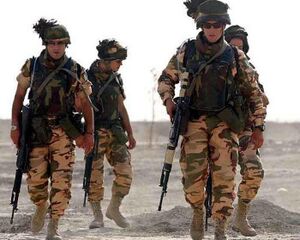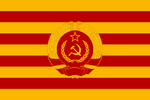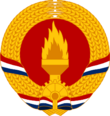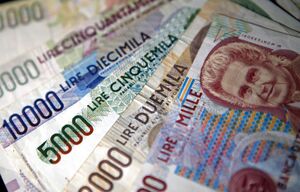Tyrellia
Democratic Republic of Tyrellia Respublica Democratica del Tyrelia | |
|---|---|
| Motto: "Joy through labour" | |
| Anthem: La Canzone Patriottica ("The Patriotic Song") | |
| Capital | Sacilio |
| Largest city | Busali |
| Official languages | Tyrelian |
| Recognised national languages | English, Tyrelian |
| Recognised regional languages | Tyrelian, English |
| Ethnic groups ((2024)) | 78.2% Tyrelian, 21.8% Other |
| Demonym(s) | Tyrelian |
| Government | Socialist republic |
• Chairman of the Tyrelian Workers' Party | Giovani Lamen |
• Deputy Secretary of the Tyrelian Workers' Party | Dario Rossi |
| Legislature | Tyrelian National Workers' Congress |
| Upper Politburo | |
| Lower Politburo | |
| Establishment | |
• City-state of Tyrel | 328 AD |
• Mercantile era | 328-1078 CE |
• Decline | 1078-1300CE |
• Formation of the Republic of Tyrelia and successor republics | 1300-1989 |
• Crisis of '89; Food Stamp Revolution | 1989 |
| Population | |
• 2024 estimate | 39,283,000 |
| GDP (nominal) | 2021 estimate |
• Total | 649.6 billion |
• Per capita | 16536.41 T$ |
| HDI (2023) | 0.847 very high |
| Currency | Tyman (T$) |
| Time zone | UTC<? (?) |
| Date format | mm-dd-yyyy (CE) |
| Driving side | left |
| Calling code | +11 |
| Internet TLD | .tr |
Tyrellia (Tyrelian: Tyrelia), officially the Democratic Republic of Tyrelia, is a country in Anteria. It borders Foxomexra to the south, Nicakher to the north, and Ahia to the southwest. A country of coastal jungle, savannah, and deserts, Tyrelia is home to the Tyrelians, and well over 14+ Tyrel-adjacent culture groups as well as Foxomexran and Nicakherian minority groups. The capital and largest city is Sacilio, a port city built on an island bordering the sea, founded in the 900s.
The name "Tyrel" historically referred to the ruling House of Tyral, known as the Doges of Tyrelia, and also stems from the word "Tyr eli", meaning "Mahogany coast". Sacilio and the largest city Busali are among the oldest continuously inhabited cities in the world. In the medieval era, Sacilio was the seat of the Republic of Vanoa and a provincial capital of the Principality of Tyrel.
The modern Tyrelian state was established in the late-20th century after centuries of rule under the republics, starting from the Serene Republic of Tyrelia (1300) to the short-lived Sixth Republic of Tyrellia (1974-89). During that time, a rampant economic crisis and housing bubble implosion caused runaway inflation, mass unemployment and general discontent; the Sixth Republic's failed attempts at stemming the recession only intensified the economic crisis, culminating in the Food Stamp Revolution.
The revolution stemmed from a food-stamp policy; unemployed citizens often relied on meagre food rations garnered from stamps and coupons to feed their families and a steady drop in the quality of the crops caused more discontent. On May 23rd, 1989, a food line in the city of Sacilio inadvertently caused a riot when the civil servants providing the grain ran out of stock; the riot devolved into a city-wide epidemic of looting, arson and vandalism. Shortly after, military forces dispatched to quell the unrest rose up too in revolt over inadequate pay and harsh treatment. Soon enough a military coalition led by the Workers' Party of Tyrellia deposed the government in the early hours of May 27th, arresting the then-Premier Nico Atagena and placing many more cabinet members under house arrest.
The post-revolution period was tumultuous, with many insurrections and coup attempts shaking the country from 1989 to 1991. The nation was under Emergency Law from 1989 to 1994, effectively suspending most constitutional protections and civil rights for citizens, until the Third Tyrelian National Workers' Congress convened and made the executive decision to suspend the Emergency Law.
The post-revolution administration has by and large extended a chokehold on the real-estate market and manufacturing industries, and continues to exercise strict control over the remaining conglomerate groups and industrial bases; while living standards are still amiable, income has dropped to around 16,000 Tymans per year, with upscaled military spending. Moderate internet censorship still occurs, mainly the censoring of pornographic content, attempted incitement of unrest, and posts criticizing the government.
City-state of Tyrellia
The city-state
End of Princely Rule
Establishment of the Republic and downfall
The Food Stamp Revolution
The 1984 economic crash in Tyrellia saw a record amount of layoffs (1,500,000) in the first month alone; the tyman's value dropped by 692% over the course of the recession and most businesses stopped paying their employees completely in the period following the crash due to lack of funds. Farms began refusing to comply with increasing crop quotas, and this stirred much unrest among rural populations and urban populations. Military attempts at intervention were turned back, sometimes with force. Food lines became common.
In addition, much of the military was disgruntled with their lack of payment, and insufficient funds to maintain their inventory of combat equipment and hardware; the upper caste of Tyrellian society largely received the blame for the crash, with the recession blamed on their unchecked buying and hoarding of wealth, their shady financial record-keeping and low tax rate, and their lobbyists pushing for an unsuccessful privatisation of government services such as healthcare and education.
The following riots throughout the summers of 1985, 1986, 1987 and 1988 saw many multibillionaires being driven out of the country and government property destroyed; increasingly-violent cycles of martial law and civil unrest led to the deaths of an estimated 2,000 alone. In particular the Workers' Party of Tyrellia, a conservative socialist coalition of seven smaller parties in the then-Senate, pushed for urgent reform and an impeachment of the administration.
The outbreak of a relatively-small scale famile in 1989 was the last straw; a riot over inadequate food supplies led to mass theft and seizure of food stamps, an escalated military response and mutiny, and a series of clashes across the nations that resulted in two days of civil strife including riots by the citizens, riots by the police who had largely went unpaid, and riots by the military, disgruntled with the idea of gunning down their own people. Many government ministers fled the nation during this time, and by May 25 most apparati of the republican administration had completely disintegrated, with widespread shutdowns of power, waste treatment, healthcare and emergency services.
By May 26, the Workers' Party had seized some 18.1 billion in surplus money left behind by billionaires fleeing the country, and used it to distrubute pay among members of the armed forces to win their support. Through the night they began taking over most government facilities, and by May 27th had restored power to select parts of the country, resumed most emergency services and mostly quelled the unrest by swaying over the police.
Continued rioting would still take place through to 1991, but through 1989 and 1990 most urban areas were under uncontested rule of the Tyrellian Workers' Party, having rebranded themselves. The TWP would continue to enact martial law and enabled a policy of deficit spending, until the economic situation had largely improved.
Come 1996 the country had finally recovered from a long period of downturn and recorded its first economic growth since 1976.
Contemporary History
After 1996 the TWP would consolidate its power through unscrupulous means; first by suspending elections, and instilling an internet firewall in early 2003, ostensibly to block "degenerate and corruptive" content as the government cited, mainly pornography, gambling sites, pro-anarchist forums, far right spaces and more; however this also aided in the introduction of the Domestic Cyber Security Law, which gave the TWP overreach to establish a law enforcement arm called the Tyrellian Cyber Authority (TCA). Notably, the TCA was caught in a scandal in 2008 where their armed law enforcement allegedly beat and arrested a forumer for making death threats against a low-ranking member of the TWP.
However, in 2010, the TCA arrested another individual, Damion Giuliani, a famed anti-socialist reporter, for publishing "disruptive" content, an article critiquing the powers of the TCA and calling for reform. The following protests led Giuliani to be released from prison and pardoned, and the TCA's executive powers rolled back.
In late 2019, however, the TCA would find itself in yet another public scandal as it fined a citizen, then aged 13, 6,000 tymans for usage of a VPN, ruled illegal under the Domestic Cyber Security Law; this again led to the rollback of the TCA's powers.
The TCA would continue to make itself a source of trouble for the government, inciting more fury after arresting a university student for making a vulgar post condemning the government, and demanding extraditions of its citizens abroad for making seditious comments against the TWP.
Meanwhile, in 2013, public interest was vested for some motnsh on the mysterious disappearance of TyrelliAir Flight 083, an international flight from Sacilio Bucanezza International Airport (SBC) to southern Foxomexra; the flight purportedly went down in Tyrellian airspace and a piece of its fuselage was later found in a farmer's paddock. The downing of the plane was attributed to the actions of the pilot, Luca Verdi, who had allegedly been suffering from self-destructive tendencies at the time, and was diagnosed with sociopathic disorder.
In 2018, Tyrellia held TyrelVision, a classical music concert comprising of 130 composers and re-enactors held in Sacilio. In 2021, groundbreaking legislation regarding LGBTQ+ rights was passed, allowing for the recognition of same-sex partners but not allowing for recognition of same-sex marriage, gender reassignment surgery, etc, and still regarded the practice of "drag" as "public indecency", punishable by either a 13,000 tyman fine or up to 2 years in prison for charges of "vulgarity" and "indecent exposure".
In 2022, the incumbent Chairman of the TWP was elected by a landslide from both the Upper and Lower Politburos. Chairman Giovani Lamen is two years through a four-year term.
Geography
Climate
Environment
Politics and government
The D.R Tyrellia operates on a "politburo" system: The Lower Politburo consists of two party delegates from each district of the country, with 97 districts total and thus 194 standing Lower Politburo members; the Upper Politburo consists of a party delegate from each province, 24 in total, thus having 24 seats. While the Lower Politburo is largely responsible for forwarding and enacting laws, the Upper Politburo is mainly responsible for the election and appointment of presidential candidates, pre-approved by the Lower Politburo, and national matters such as defense, border control, finance, et cetera.
Chairmen of the Politburo and Party serve four years' terms; the Politburos have multiple side branches for the purpose of providing insight from minority ethnic groups and the common populace.
Military
Main article: Tyrellian People's Army

Tyrellian soldiers are still somewhat still in a late-2000s level of technology, employing dated weaponry and hardware; mandatory military service is expected of all men aged 19-20, where they are sent into the military for basic training before being discharged; however starting at age 14 one can volunteer for community service, or work part-time jobs in aiding the armed forces to commute their mandatory service time to nine months.
There have been many allegations of hazing, racism and classism within the military, which has not yet been addressed; the current Supreme Marshall of the Armed Forces, the chief official formally responsible for the management of the military, is Umberto Bellizia.
Currently gun laws are lax in the country, and citizens may purchase small weapons, as under the 1998 Civil Militia law: "Citizens may purchase any firearm of pistol caliber, 9mm, semi-automatic, with a magazine no larger than 12 rounds, and manufactured by a licensed brand, and must obtain a civil firearms license before doing so. A firearm license can be obtained by providing a valid reason (Farmers are allowed higher-caliber hunting rifles for pest control and hunting): "self-defence" is no longer an accepted intention for firearm purchase, but "Deterrence of home invasion" is. Each firearm is marked with a serial number by its manufacturer.
Weapons companies Rosetta and Cardinale are the two main suppliers of military hardware for the military; they manufacture APCs, transport vehicles, medical equipment and firearms.
Foreign relations
Economy
The economy of Tyrellia is primarily dependent on manufacturing, finance, light industry and shipbuilding; the Alto Regiano shipyard is one of Thrismari's most productive shipyards capable of accomodating 80 ships for repairs and building 30 ships at once in separate drydock slots; meanwhile, the light industry sector is primarily made up of I.T services, web development, and banking services, and exports primarily radio communication equipment, textiles and crops of corn, cotton and chili peppers.
Currency
The Tyrellian tyman (T$) is the standard currency of Tyrellia, issued in 10, 20, 50, 100, 200 and 500 coins, and 1000, 2000, 5000 and 10000 notes. Printing of the notes and minting of coins is overseen by the People's Bank of Tyrellia and adjusted according to inflation. Its purchasing power is compared to Riamese hull for economic analysts.
Natural Resources
The Tyrellian countryside primarily holds large deposits of tin, lead, chromium, phosphates and natural gas; in addition, titanium, iron, coal and graphite are also found in smaller amounts. In addition, the nation also hosts aluminium foundries where foreign material is shipped in and aluminium is shipped out. The nation also exports large amounts of coffee beans, chilli, corn, flour and potatos as natural produce and is one of the world's largest producers of coffee beans.
Transport
The Tyrellian transportation industry is primarily comprised of heavy rail, and very little high-speed railways, instead having extensive networks of regular railways, with sleeper cars and multi-day journeys to cross the country by rail; in comparison, the air travel network is highly developed and almost every province has a main airport.
During the Republican era from 1970-1976 the government invested massive sums of money into the construction of airports and railways shortly before onset of economic trouble caused the nationwide construction project to be abandoned.



